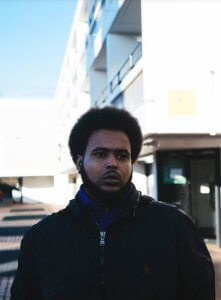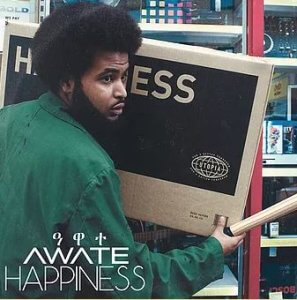 Awate simply inscribes his social media bios with “I make great rap music”. If we talk about the value of speaking words into existence, then the Camden rapper is proving those words and is quickly rising as a formidable force in the UK hip-hop scene. Check his resume: he was named as one of the seven most inspiring people in London by the Evening Standard, he’s written for the Guardian, toured with Lowkey and has supported the likes of Jay Electronica, Big Daddy Kane and Yasiin Bey (AKA Mos Def).
Awate simply inscribes his social media bios with “I make great rap music”. If we talk about the value of speaking words into existence, then the Camden rapper is proving those words and is quickly rising as a formidable force in the UK hip-hop scene. Check his resume: he was named as one of the seven most inspiring people in London by the Evening Standard, he’s written for the Guardian, toured with Lowkey and has supported the likes of Jay Electronica, Big Daddy Kane and Yasiin Bey (AKA Mos Def).
Originally arriving in the UK as a refugee from Eritrea via Saudi Arabia, Awate’s music focuses on the intersection of poverty, race and social justice. His lyrics are a scathing indictment of the powers that be, so it’s no wonder he’s also a prolific activist and writer.
He dropped his first release Shine Ancient in 2016 and releases his long-awaited debut LP, Happiness on 22nd February. We caught up with the North London rapper to discuss his album and his thoughts on the way the world is going.
Let’s talk about the Happiness LP dropping in February. What can we expect from the project?
You can expect to be transported to a world with a new set of rules. Where every note of music sounds like the best option and every word is deliberate. It’s my manifesto for quality.
I wrote and recorded it when I was out on bail for two years, fighting four court cases against the police. That gave me a lot of time in limbo to think about quite elaborate ideas about what makes the perfect lyric, song and album.
Who are your musical influences?
I like witty artists who flood you with melody. Early on my first musical hero was 50 Cent, then Mos Def (now Yasiin Bey), Lauryn Hill, The Stone Roses.
I’m missing out 100 artists because this question is so open ended it’s like asking a chef what their favourite ingredients are!
A lot of rising or aspirational artists go into music wanting to go mainstream: playing on mainstream radio stations, making big festival appearances, etc. But on Jewels you rapped: “Wack attitudes remain, but I’m not sweating it/ I’m not concerned about my work being credited/ but if they’re sleeping on me they’re on sedatives.” That raises the question: what’s your main goal with your music?
There is no main goal really. It’s a funny question — probably because I’ve been doing it so long. Starting out, the goal was for me to do something creative that would take my focus away from beating up bullies and throwing chairs at racist teachers. Then it becomes an ego thing as you realise the competitive aspect of it and are battling people at lunch time or in the smoking section of a show.
At this point, I just want to make a living by creating art after working so many random jobs. Saying that, ultimately of course I want to break through and rap my way into being in Star Wars 14 or star in Black Panther like my bredrin Daniel Kaluuya.
Just by making music, it helps my self-esteem and the next goal is to get that out to young people, poor people… black people, maybe a little bit more specifically, in order to fill the void that living in this world creates.
As far as Black British music goes, the music press appears to be mostly preoccupied with grime. Do you feel that makes it harder for UK hip-hop artists who don’t fall strictly into that genre?
Yeah but that’s because UK Hip-Hop lost the Cold War with Grime in 2007 when Deal Real closed and grime acts started getting signed left right and centre.
I’m a complete rap artist, in the sense that labels won’t really stick if you listen to my music. I’m a mix of gangsta rap, battle rap, dense intellectual rap, blues, jazz, funk and psychedelia. That’s what you have to be in order to create your own sound and stay away from labels. Switch it up on ‘em.

Your music is very political, and you do a lot of activism as well. Was there a specific moment in your life that made you become politically and socially aware?
Here we have a philosophical disagreement. All music is political. Everything is political. The ability to see the reasons behind situations maybe means that I’m more aware but not more political.
The more you’re aware of injustice, the harder it is to ignore it. Other people let me know early by how I was treated that I was different. The reasons: being a refugee, black, Muslim, working class or whatever happen to be things that are easily tied to politics, but nihilism and consumerism are just as political.
You talk about racism and inequality a lot in your music. What do you think are the most pressing issues for BME and working-class people in the UK?
The same issues from fifty years ago. Nothing has changed other than perception.
I just want to break down a few lyrics from The Ghetto. You start off your verse describing impoverished places in London as being areas “where the police are a plague on our communities” and end the song with, “don’t call feds to report our disturbances”. What are your main gripes with the way policing is done in the UK and how would you fix them?
My main gripes with the police is that they exist in the first place and have powers of arrest. Hand in hand with the prosecution service, they terrorise and traumatise us.
I’ve been punched in the face ten times with my hands cuffed behind my back while sitting in a van. I’ve sat and seen police just wildly invent stuff that could be from an action movie in court while my future was in their hands.
There is no quick fix. Systematic change is needed.
You grew up in Camden and were a Resident Artist in The Roundhouse. You even say on Jewels, “I romanticise everything in Camden; poor, young and still an artist”. What’s it like being a rising artist in Camden, do you have a lot of support from your home turf?
Camden is like another country entirely. Some fairy-tale world with wizards, punks and mermaids floating around on broomsticks while the feds chase youts up the high street past some millionaire’s street into their estate. I get a lot of support from all types of people. When size? opened a new location in Camden they got me to do the launch and bring some of my people’s down. It feels really good to see rep an area that hasn’t had a big MC put it down before.
Mark Mukasa
Latest posts by Mark Mukasa (see all)
- ON SCREEN | TRAILER FOR ‘HAMLET’ STARRING RIZ AHMED UNVEILED — December 19, 2025
- INTERVIEW | SELINA BROWN ON FAMILY, FOOD AND CULTURAL PRIDE IN HER NEW CHILDREN’S BOOK ‘MY RICE IS BEST’ — April 28, 2025
- EUROPEAN PREMIERE OF ‘PIECE BY PIECE’ STARRING PHARRELL WILLIAMS TO CLOSE THE 68TH BFI LONDON FILM FESTIVAL — August 20, 2024
